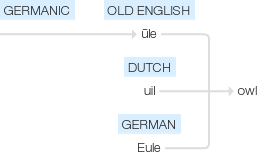Owl
Old English ūle, of Germanic origin; related to Dutch uil and German Eule, from a base imitative of the bird's call.
wiktionary
From Middle English oule, owle, from Old English ūle, from Proto-Germanic *uwwalǭ (compare West Frisian ûle, Dutch uil, Danish and Norwegian ugle, German Eule), diminutive of *uwwǭ(“eagle-owl”) (compare German Uhu), of imitative origin or a variant of *ūfaz, *ūfǭ (compare Old English ūf or hūf, Swedish uv(“horned owl”), Bavarian Auf), [1] from Proto-Indo-European *up- (compare Latvian ũpis(“eagle-owl”), Czech úpět(“to wail, howl”), Avestan 𐬎𐬟𐬌𐬌𐬈𐬌𐬨𐬌 (ufiieimi, “to call out”) [2] [3]. A Germanic variant *uwwilǭ was the source of Old High German ūwila (German Eule).
etymonline
owl (n.)
"raptorial nocturnal bird of prey of the family Strigidæ," Middle English oule, from Old English ule "owl," from Proto-Germanic *uwwalon- (source also of Middle Dutch, Dutch uil, Old High German uwila, German Eule, Old Norse ugla), a diminutive of PIE root *u(wa)l-, which is imitative of a wail or an owl's hoot (compare howl and Latin ulula "owl;" also see ululation).
The bird was used in proverbs and figures of speech in reference to its nocturnal habits, but also in Middle English for ugliness (late 14c.), spiritual blindness (c. 1400), and maliciousness (mid-15c.). It was a name for Satan in early 15c. The association with gravity and wisdom comes later, after the revival of classical learning: A small, brown type of owl is common on the Acropolis and about Athens and was hence taken in ancient times as an emblem of the city and by extension of its patron deity, Athene, goddess of wisdom. Hence also the saying bring (or send) owls to Athens "perform unnecessary labor."
By 1895 in reference to a person whose pleasure or business is to be up at night. Owl-flight "twilight" is from late 15c. The name of the trickster Till Eulenspiegel (literally "owl-mirror") of the popular German tales was rendered in English as Owlglass when they were first translated c. 1560; Jonson and Scott use the half-translated Owl-spiegle.
owl (v.)
"carry on an unlawful or contraband trade at night," 1540s, from owl (n.). Related: Owled; owler; owling.
